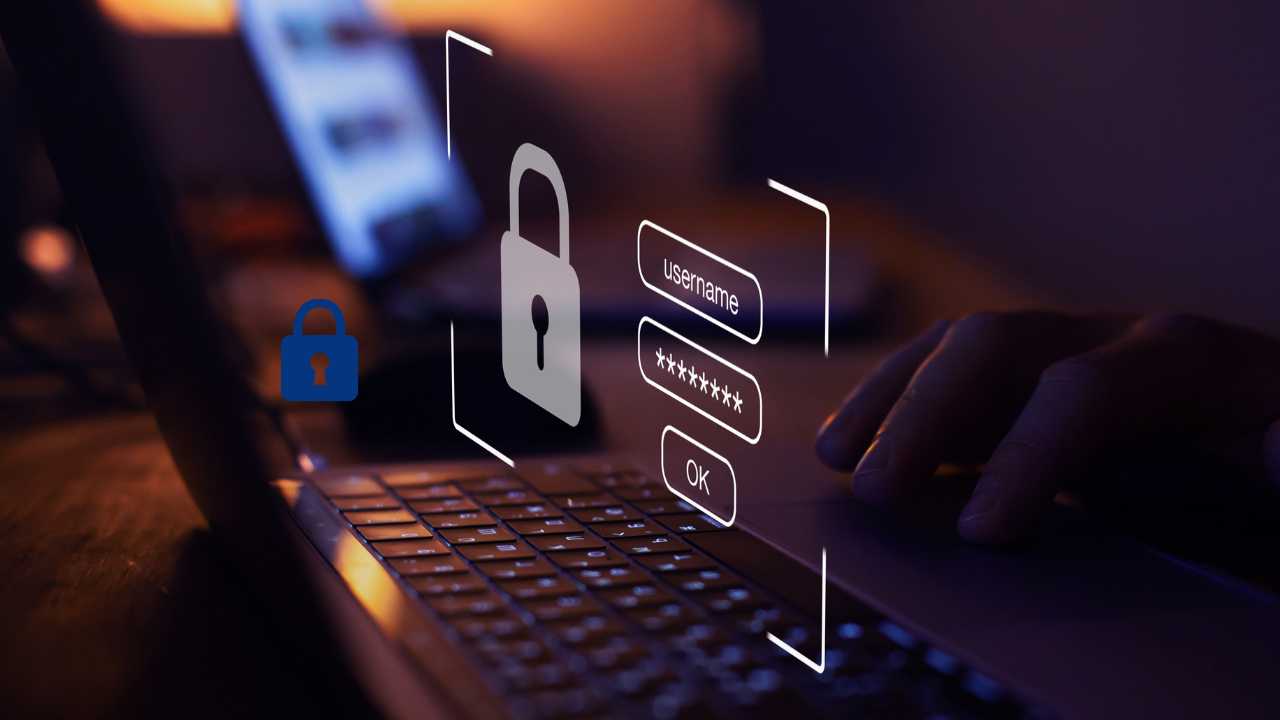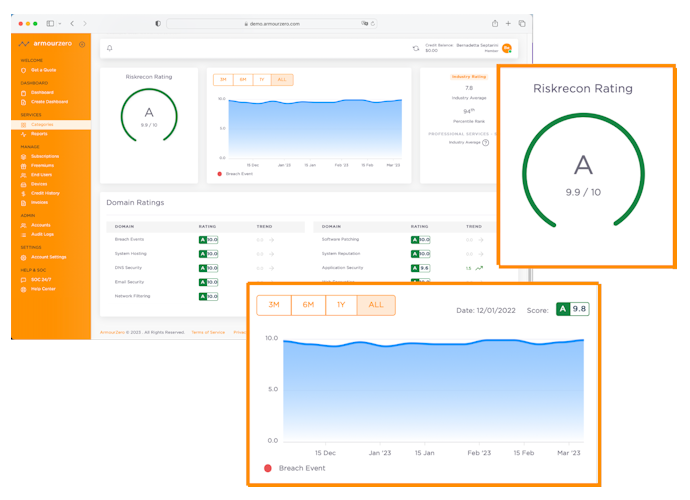Why do Security Ratings
Matter for Businesses?

According to IT Governance, a global provider of cyber risk and privacy management solutions, 41.9 million records were compromised by cyberattacks worldwide in March 2023. 100 publicly disclosed security incidents were also discovered by IT Governance, an increase from February’s 106 publicly disclosed security incidents and 29.5 million compromised records. With a 951 percent increase since March 2022, these March statistics also exhibit an upward trend year over year. Three of the major data breaches that occurred in March 2023 were affected; Latitude Financial, Go Anywhere with AT&T.
The high volume and high sensitivity of the cybersecurity need a stricter assessment of technology systems, from websites, cloud services, to wherever else data is stored. However, companies frequently ignore vulnerabilities in their third-party and immediate environments. That’s why organisations need to start implementing security risk rating assessments to their vendors and themselves.
What are security ratings?
A cybersecurity rating (also known as a Security Rating) is a measure or assessment of an organisation’s or system’s cybersecurity posture and overall security readiness. This assessment enables professionals to confidently make risk decisions rapidly, providing ratings that assess real-world cybersecurity risk management quality. Also, it provides an indication of how well an entity is protecting its digital assets, including data, networks, systems, and applications, from potential threats and vulnerabilities.
In general, security ratings are generated by security rating services or tools that use various data sources and methodologies to evaluate the security posture of an organisation. These tools collect information from public sources, such as internet-wide scanning, domain reputation, and data breaches, to assess the organisation’s cybersecurity practices and potential risks.
The security rating is often represented as a numerical score or a letter grade, with higher scores or grades indicating better security posture. For example, an A – F labelled scale and 0.0 – 10 numeric scale. The rating is based on the rates and risk priority of issues present in the environment as observed by the platform algorithms. The rating helps organisations understand their current security state, identify areas of improvement, and compare their security performance with industry benchmarks or peers.

Example of Security Risk Rating Report
Through this report, organisations can assess their security posture, prioritise security investments, and communicate their level of security readiness to partners, customers, and stakeholders thanks to the useful insights security ratings offer. By evaluating the security rankings of external partners or vendors, they can also assist businesses in identifying potential risks or vulnerabilities in their supply chain.
Why does security ratings matter for business?
Security ratings matter for businesses due to several key reasons:
-
Risk Management
Security ratings provide businesses with a clear understanding of their cybersecurity posture and the associated risks. Organisations can identify vulnerabilities, weaknesses, or gaps in their security measures by evaluating their security ratings. With the help of this information, they can effectively allocate resources and set priorities for risk mitigation efforts to deal with the most pressing security concerns.
-
Third-Party Risk Management
Businesses often rely on outside suppliers, partners, or vendors who may have access to their sensitive information or systems. Security ratings help evaluate the security posture of these third parties. From the assessment, companies can choose partners with stronger security procedures, ensure the security of their supply chain, and make informed decisions about engaging with vendors by evaluating their security ratings.
-
Compliance and Regulatory Requirements
Most of the time, many companies are required to follow a variety of industry-specific security standards and laws. Security ratings help assess compliance with these requirements and identify areas where improvements are needed. With the security rating report, a company can show they are committed to upholding regulatory requirements by maintaining a favourable security rating, which will also help them avoid possible fines or penalties.
-
Reputation and Trust
A strong security rating enhances an organisation’s reputation and instils trust among customers, clients, and stakeholders. A high score in security risk ratings demonstrates the organisation’s commitment to safeguarding sensitive information and maintaining a secure environment. A company that prioritises security and data protection can stand out from its rivals, draw in new clients, and keep hold of its current ones by maintaining a high security rating.
-
Competitive Advantage
In this increasingly digital environment, customers are becoming more concerned about the security procedures used by the companies they do business with. Therefore, a strong security rating can give an organisation a competitive edge by demonstrating its dedication to cybersecurity and instilling trust in its capacity to protect customer information. It can be a crucial factor in winning contracts, partnerships, or business opportunities.
-
Cyber Insurance and Financial Considerations
Some cyber insurance providers consider security ratings when determining coverage and premiums. A lower risk profile can be indicated by a higher security rating, which could result in more benevolent insurance terms. As part of their due diligence procedures, financial institutions and investors may also evaluate security ratings, which can have an impact on choices about funding, investments, or mergers and acquisitions.
-
Continuous Improvement
Security ratings provide a benchmark for measuring progress and improvement over time. Businesses can track their progress in improving their cybersecurity posture by periodically monitoring their security rating and putting corrective measures in place. Organisations can use this iterative process to spot trends, evaluate the success of security initiatives, and promote constant development of their security procedures.
Conclusion
In conclusion, security ratings play an important role by providing a comprehensive assessment of an organisation’s cybersecurity posture. Security ratings enable businesses to effectively manage risks, evaluate third-party partners, adhere to compliance requirements, build a strong reputation, gain a competitive advantage, consider insurance factors, and drive continuous improvement.
Through the utilisation of security ratings, organisations can proactively identify and address cybersecurity risks, ensuring the protection of valuable assets and sensitive data. Moreover, by maintaining a favourable security rating, businesses can instil trust among stakeholders, including customers, clients, and investors, showcasing their commitment to cybersecurity and data protection.
If you’re looking to improve your business’s cybersecurity to include third-party and supply chain, consider trying cybersecurity risk assessment from ArmourZero to get a clear understanding of your risks and prioritise your efforts to reduce those risks. Contact us for further information.
![]()
Written by:
Fanny Fajarianti (Performance Marketing). Experienced digital marketer in the information technology and services industry.
Share this post
Related Posts

5 Ways ArmourZero DevSecOps Simplifies Security for DevOps
- 02 May 2024
- By:Fanny Fajarianti
- Category: ArmourHacks
Discover how ArmourZero ScoutTwo, the AI-powered unified DevSecOps platform, simplifies security for DevOps. Let ScoutTwo empower your development life cycle.

Earth Day: The Connection of Cybersecurity and Sustainability
- 22 Apr 2024
- By:Fanny Fajarianti
- Category: ArmourHacks
Uncover the link between Earth Day and Cybersecurity, promoting sustainability through data protection and environmental stewardship. Let’s secure a greener future.

What is DevSecOps? Definition & Best Practices for Tech Industries
- 18 Apr 2024
- By:Bernadetta Septarini
- Category: ArmourHacks
Learn about DevSecOps, principles, and best practices for the tech industry. Integrate security seamlessly into software development and enhance quality.

Safeguarding Your Organisation During the Hari Raya Holiday
- 09 Apr 2024
- By:Bernadetta Septarini
- Category: ArmourHacks
Protect your organisation from holiday cyberattacks during Hari Raya. Learn more about the risks and best practices for holiday security with ArmourZero.

